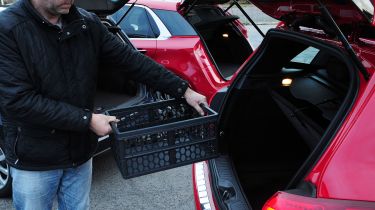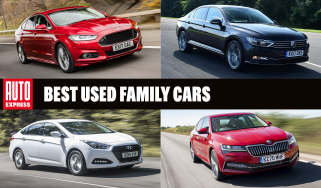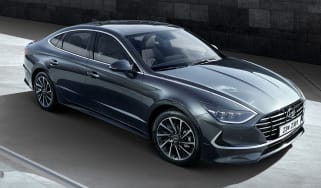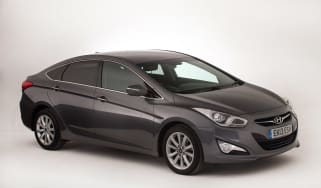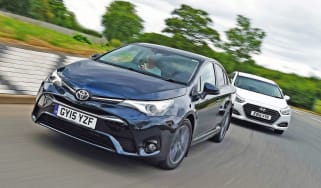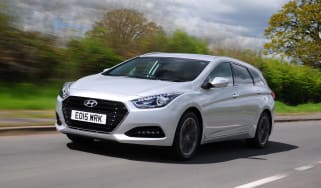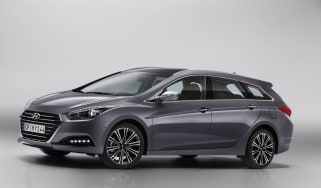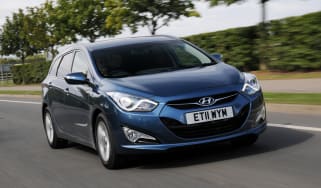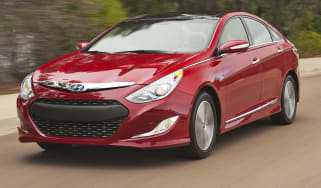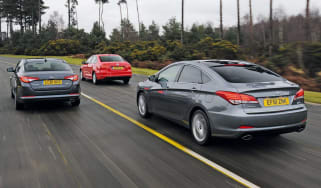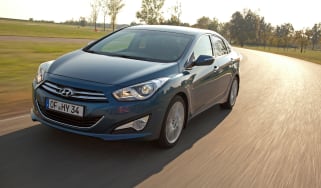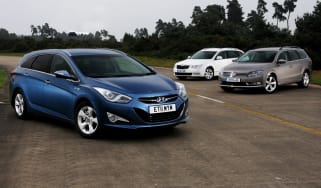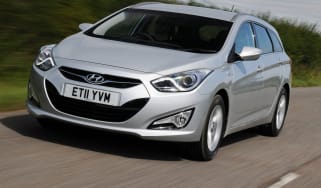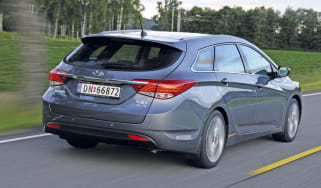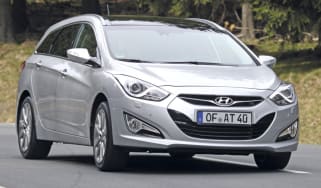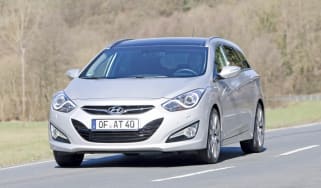Hyundai i40 (2013–2019) review
The spacious and practical Hyundai i40 saloon offers bold looks, great economy and lots of kit

Past Hyundai family cars haven't been big sellers, but the Hyundai i40 has managed to buck that trend somewhat. Its combination of bold looks, a spacious cabin and a long kit list have given it appeal ever since it arrived in 2012. Unfortunately, time has moved on, and while the family car class has taken a beating courtesy of the popularity of SUVs, the i40 hasn't kept pace with other cars in the class either.
There was an update in 2015 with revised specification and a subtle tweak of the looks, but the i40 was already a handsome looking family car already, so it didn't need much doing to it. As always, there are two body styles to choose from: the i40 saloon and i40 Tourer estate.
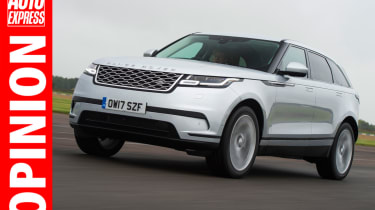
Rivals for the i40 are the usual family car suspects. So this includes the Ford Mondeo, Skoda Superb and Vauxhall Insignia Grand Sport, although all three of these are more spacious inside. The VW Passat is another car worth considering, despite its upmarket pretensions, as is the sporty Mazda 6, while the Kia Optima is closely related to the i40, as it uses the same engines and running gear.
Unlike the Optima, there's no hybrid option in the i40, just a 1.7 CRDi Blue Drive four-cylinder diesel in 115PS or 141PS guises. This motor has a decent mix of performance and economy, though, which means the i40 is popular with company car buyers. All cars are front-wheel drive with a six-speed manual gearbox as standard, although a seven-speed DCT auto is available with the more powerful engine.
Used - available now

2022 MG
HS
12,807 milesAutomaticPetrol1.5L
Cash £16,287
2021 Citroen
C1
11,182 milesManualPetrol1.0L
Cash £9,487
2017 Vauxhall
Insignia
96,309 milesManualDiesel1.6L
Cash £4,500
2019 Land Rover
Range Rover Evoque
94,100 milesManualDiesel2.0L
Cash £8,750Overall, there are four specifications - S, SE Nav, SE Nav Business and Premium - but all models are reasonably well equipped. Standard kit includes 16-inch alloy wheels, seven airbags, Bluetooth, stop-start, a multifunction steering wheel, heated electric door mirrors, auto lights and air conditioning.
As is usual with Hyundai models, there aren't many options, and you're expected to move up a trim level if you want more kit. Do this and you'll add kit such as 17 & 18-inch wheels, leather, sat-nav, parking sensors and a camera, keyless entry, a heated steering wheel and seat heating.
One highlight of the i40 range is its pricing. It starts from around £20,500 and the most expensive model is just under £28,500, so it offers really good value. And of course the i40 comes with Hyundai's excellent 5-year, unlimited mileage warranty.
The Hyundai i40 isn't the most exciting car to drive, but it gets a lot of things right. While it's not the most spacious family car on sale, it has plenty of useable space, while the all-diesel engine line-up offers great economy that will keep your running costs down.
Higher spec cars are well equipped and reasonably priced, while that Hyundai five-year warranty holds plenty of appeal, too. If you want an honest, reliable family car that gets the job done without fuss, then the i40 fits the bill. Just don't expect it to deliver a memorable driving experience.
Engines, performance and drive
Under the skin, the Hyundai i40 shares its platform with the Kia Optima, and it has a conventional front engine, front-wheel drive layout.
The i40 is geared towards the everyday motorway slog, rather than being a finely honed back roads blaster. However, the update in 2015 saw new suspension settings added which means the Hyundai is more capable than you might imagine.
Head down a twisting back road, and it’s clear the suspension upgrades have paid off. The steering is light and short on feedback (there is a Sport setting, although it still feels artificially heavy), but there’s strong bite from the front tyres and the i40 feels balanced and secure. That's despite a surprising amount of roll from the soft suspension, although the i40 does feel relatively light on its feet when compared to some family car rivals, although a Mazda 6 will run rings around it for sporty driving ability.
The upshot of the i40's supple set-up is a comfortable ride, and it glides over bumps and potholes with great composure. But while the car is comfortable, it generates more wind, road and engine noise on the motorway than most rivals.
Engines
While the similar Kia Optima comes with a hybrid option, the Hyundai i40 is only offered with a 1.7 CRDi diesel. It comes in two power outputs, though, badged 115PS and 141PS. Both come with a six-speed manual as standard, which has a reasonable shift, if not quite as positive as a VW gearbox, while the more powerful motor can be had with a seven-speed DCT twin-clutch auto.
The 1.7-litre diesel has been tuned for efficiency, so performance isn't the most spectacular. The 115PS motor gives the i40 a lethargic 0-62mph time of 12.4 seconds, while the 121PS version manages it in 10.3 seconds. Add the DCT auto and this increases to 10.8 seconds, which demonstrates the auto's relatively slow shifts.
The engine itself is pleasantly refined,, while a useful 340Nm of torque is offered by the more powerful version. As a result, the Korean machine feels punchy when you really push on, and it's well suited to towing, too.
MPG, CO2 and Running Costs
When it comes to reducing the impact on your bank balance, the Hyundai i40 makes a decent amount of sense. This starts with the i40's purchase price, which runs from around £20,500 to £28,500. The entry-level car has a reasonable amount of kit, but the top-spec car is packed with goodies, while the only option on all cars is metallic paint.
Beyond that, there's a Visibility Pack available on the top-spec Premium model, which adds xenon lights with auto dipping and speed limit recognition for around £1,000, but that's it - if you want extras, you're going to have to move from one trim to the next.
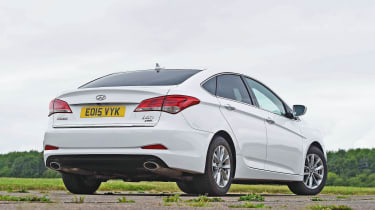
Official fuel economy for the i40 saloon sees the 1.7 CRDi 115PS engine returning 67.3mpg, while the 141PS version manages 65.7mpg, or 60.mpg with the DCT gearbox. With figures so close between the two power outputs, we'd choose the 141PS manual over the 115PS version.
Emissions are 110g/km, 114g/km and 123g/km for the respective engines, so there's not too much of a financial penalty for business users who decide to go for the more powerful motor. Road tax is £140 for all models.
In the real world, we managed 43.3mpg in a 141PS version of the i40, which is fairly average for a family car. On the plus side there's a 70-litre fuel tank, which means there's the potential to travel almost 700 miles between fills.
Insurance
Modest performance and a host of safety kit help the Hyundai i40 fall into groups 13-20 for insurance, which means costs should be pretty reasonable.
Depreciation
Residual values for the Hyundai i40 aren't brilliant, falling somewhere between 38-41 per cent. That's better than the Vauxhall Insignia Grand Sport and about the same as the Ford Mondeo. But even the Kia Optima has better residuals.
Interior, design and technology
The sleek i40 has never struggled to score points in the style stakes, so it’s no surprise that Hyundai’s designers have kept the changes to a minimum. Look closely and you’ll spot the new hexagonal front grille, reprofiled headlamps with LED running lamps and subtly tweaked front and rear bumpers.
Elsewhere, the styling remains unchanged, which means you get the same distinctive wedged profile, low-slung roofline and heavily sculpted flanks. The 16-inch alloys fitted to our SE Nav test car look a little lost in the i40’s large wheelarches and some of the body detailing is garish, particularly the chrome finished door handles, but overall the Hyundaistill packs plenty of kerb appeal.
Climb aboard and it’s immediately clear that Hyundai spent less time updating the i40's interior. The revised infotainment system features easier to reach controls, but otherwise the cabin is unchanged. That’s a shame, because the ‘wave effect’ dashboard design looks dated, while the imposing centre console seems cluttered, with numerous buttons for the air-conditioning and audio controls.
The rest of the interior feels solidly screwed together and most of the plastics are of a decent quality, but it doesn’t look and feel as upmarket as a Skoda Superb or Vauxhall Insignia Grand Sport. Still, there will be no complaints about the amount of standard kit, with the SE Nav getting heated seats, a DAB radio, Bluetooth and rear privacy glass.
Sat-nav, stereo and infotainment
All cars get a six-speaker stereo with Bluetooth phone connection, but you have to upgrade to SE Nav to get DAB radio, Apple CarPlay and Android Auto. These are included as part of the Nav upgrade, which adds touchscreen sat-nav with traffic and live services. This system is pretty good, with clear graphics and an easy-to-use menu system.
Practicality, comfort and boot space
The Hyundai i40 is a very conventional four-door saloon in its layout and dimensions. It's not the biggest family car on sale, but it has acceptable room for four inside and five can fit in fairly easily, too. Boot space is also reasonable, although that four-door layout does mean that access isn't the best - if you want more space and easier access, there's always the i40 Tourer estate to choose instead.
Size
The Hyundai i40 saloon measures 4,745mm long, 1,815mm wide and 1,470mm tall, and there's a 2,770mm wheelbase. In comparison, the i40 Tourer is 30mm longer than the saloon. The i40 isn't the biggest family car in the class - the Ford Mondeo, Mazda 6 and Skoda Superb are all physically larger.
Leg room, head room & passenger space
The i40's relatively small dimensions mean it's not as spacious as its class rivals, but that doesn't mean it's tight for space. There's still a reasonable amount of head and legroom on offer, it's just that there isn't an excess of space on board.
Access to the back seats is fine, although the swoop of the roof line means some occupants may want to duck a little lower than normal to avoid banging their head. Once inside, rear seat passengers get a 12V socket, air vents, seatback pockets and a pair of Isofix child seat anchors on the outer chairs, while the centre seat has a fold-down armrest with two cup-holders. Privacy glass is added to SE Nav cars, while an electric rear window blind and heated outer rear seats are standard on Premium cars.
Up front, SE Nav cars and above get a heated steering wheel and electric seat adjustment, and SE Nav Business adds memory seats with ventilation and leather trim. There are additional 12V and USB sockets up front, too.
Boot
Boot space measures in at 525 litres in five-seat mode, which isn't great when compared with cars like the Ford Mondeo and Skoda Superb. Access is also harder, courtesy of the i40's saloon body - the other two are hatchbacks, which makes them far easier to load.
There are 60:40 split folding seats in the back, but the through loading is a bit tight thanks to the saloon body.
The i40's payload reduces as you move up the range, with the 115PS model able to carry 456-593kg, and the 141PS DCT only able to carry 439-576kg. Towing weights are 1,500kg for the 115PS engine and 141PS DCT, while the manual version of the 141PS engine can haul 1,800kg.
Reliability and Safety
In the past, the Hyundai i40 hasn't been a strong performer in the Driver Power owner satisfaction survey. In 2015, it finished in 85th place, with a poor 151st place for reliability, while build quality was ranked 128th.
Hyundai claims it ironed out the gremlins with the facelift, and there's nothing to doubt that this is the case. At least there's a long warranty to cover you should anything go wrong.
Euro NCAP tested the i40 in 2011 and awarded it a full five-star rating. The assessment has been made tougher since then, but the Hyundai remains a safe choice. All versions get seven airbags, stability control and warning lights that flash during sudden braking. However, autonomous emergency braking isn’t available, while lane departure warning and road sign recognition only feature on flagship Premium models.
Warranty
If any problems should occur, then it’s reassuring to know that every Hyundai model is covered by the brand’s comprehensive five-year warranty package. This has an unlimited mileage limit, for even greater peace of mind.
In addition, Hyundai offers breakdown cover on a 12-month basis which renews every time you get you car serviced at a Hyundai dealer. Hyundai also offers annual inspections for the first five years of a car's life to help keep it in top condition.
An anti-perforation warranty guarantees against rust or corrosion forming from the inside out for 12 years.
Servicing
Hyundai offers a bespoke range of service plans for its cars. These are dependent on mileage and the age of the car. The i40 has generous service intervals of every 24 months or 20,000 miles, whichever comes first. Combine these with one of Hyundai's made-to-measure service plans, and the i40 could be a car that costs very little to run while you own it.
For an alternative review of the latest Hyundai i40 Saloon visit our sister site carbuyer.co.uk
